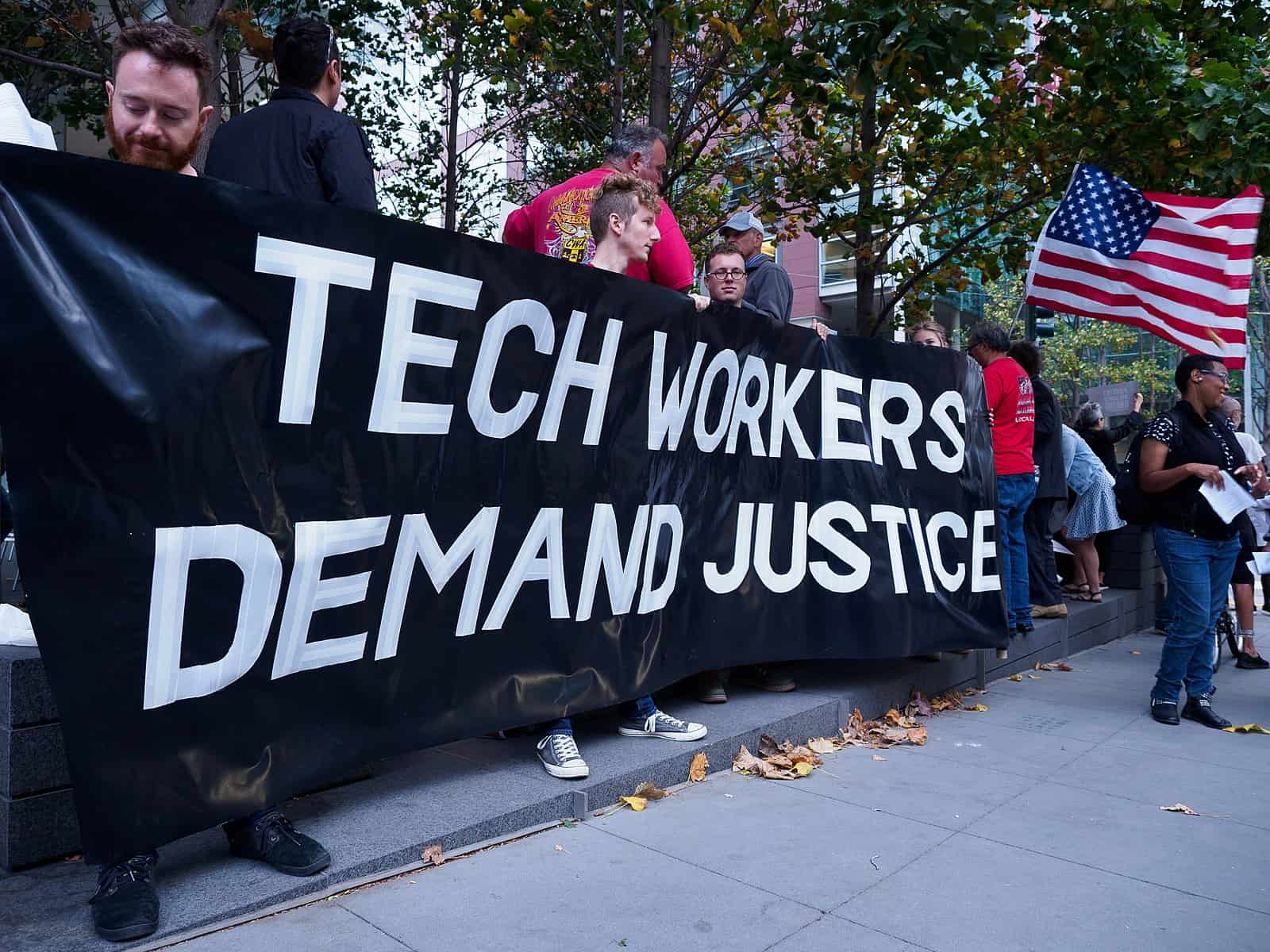
Jacki Silbermann is a student at Harvard Law School and a member of the Labor and Employment Lab.
This is the final post in a series of three. Read part one and part two.
Building on two previous posts, which reviewed some of the issues at the center of recent and ongoing collective action in the tech, the present legal landscape and three possible normative justifications for employee voice in employer business decisions that present moral dilemmas, this third and final post will offer three additional normative justifications.
Moral Agency and Non-Domination
According to a moral agency justification for worker voice in business decisions, individuals should have the ability to express their moral codes in the workplace and through their work, as the workplace, like other areas of civic life, is a sphere for individual self-expression, including moral convictions. From a neo-republican perspective, denial of such agency by a higher authority, like an employer, can constitute a form of domination over individuals.
Many tech employees, like other workers, feel intimately connected to and responsible for their work and work product. As one Google worker described when software she wrote was later sold to ICE for the agency’s operations: “It was gut-wrenching. It was the software I wrote that I was most proud of.” Other Google workers claim they chose to work on specific projects precisely because the work was, or on its face seemed to be, unrelated to any government programs that employees deemed morally problematic.
Given the significant contribution that work makes to one’s character and personal identity, coupled with the amount of time most individuals spend at work, an argument can be made that preserving individuals’ moral agency in the workplace is part of maintaining a just and fair society. This could require that labor laws support and protect workers’ ability to negotiate morally-problematic business practices with employers and to conduct concerted activity over such demands.
An obvious objection to this claim, voiced by Palantir CEO Alex Karp among others, is that employees are not obliged to continue work that they deem immoral and are free to leave the employer for work that is more amenable to their moral standards. However, this vastly underestimates the difficulty that workers face in leaving a job and securing new employment. It also presupposes that finding alternative employment will solve the moral issue. In fact, it may be quite difficult for a worker to secure alternative employment that does not draw similar moral objections because the moral concerns in the tech industry are largely systemic: A number of tech companies profit from contracts with ICE, many develop warfare technologies, and various companies’ production processes negatively impact climate change efforts. Thus, preservation of moral agency at work may rely on workers’ ability to collectively voice issues and promote changes within the workplace.
Freedom of Expression on Issues of Public Concern
Present U.S. law affords constitutional protection for public employee speech under the First Amendment insofar as the speech relates to issues of public concern. Such protections do not, however, extend to the private sector, where protected activity (Section 7 domain) must bear a close enough connection to employees’ personal interests. However, if issues of public concern are what determine the need for protected speech in the public sector, then it may be just as important to protect private sector concerted activity when such activity surrounds issues of public concern.
Noting the strong link between employee grievances regarding ethical business practices and broader political and social matters of public concern, Professor Cynthia Estlund has argued that private sector employees may be similarly positioned to furnish the public with important information regarding the actions of influential economic actors. Writing close to thirty years ago, Professor Estlund’s assertion has only been reinforced over time, with an ever-growing bond between private economic actors and socio-political developments. As government contracts with the private sector become increasingly pervasive in both foreign defense and domestic programs, private tech has become increasingly central to guiding public policy. These companies are also some of the most prevalent commercial actors in the U.S. and around the world, their products and services dominating the consumer market and the public’s access to information. Private tech’s key role in the economy and politics and its deep connection to policy choices generate a strong public interest in being informed about how these companies do business, with whom, and toward what ends.
Additionally, private sector employees may be the best, if not the only, actors to effectively inform the public about the nature of certain government operations that largely rest on work contracted out to private companies. For example, Google’s Project Maven, a Department of Defense contract for developing drone-operated video surveillance technology, remained a secretive endeavor for six months until troubled employees began looking into the project, pulling internal files and code that hinted at development of drone warfare capabilities. The key to disseminating information to the broader public on the type of warfare the U.S. government sought to further, and Google’s hand in it, lay in employees’ access to internal documents and code and their ability to decipher the latter. Google’s secret project to develop a censored search engine for China (Project Dragonfly) would have also likely succeeded unbeknownst to Google users all over the world had Google employees not brought the project to the public’s attention.
Bolstering Worker Power
Giving workers a right to a voice in business decisions may not rest on any inherent right that dictates that workers should have some voice when such decisions implicate moral issues. Rather, it may be justified as part of an overall objective to increase worker power in order to create economic and political equity. Corporate power lends itself to political power and, as described above, the products and services that the tech industry develops strengthen the mechanics of specific political policies and contribute to broader political agendas. Business is not just business; it is very much political. Thus, expanding the subjects of bargaining and protected concerted activity to include all subjects that have an impact on workers, including the moral implications of employer business decisions for the broader public, is part of a greater attempt to increase worker political voice.
Looking Ahead
The ability of any of these frameworks to justify collective action protections and a duty to bargain over moral issues also hinges on their applicability to the types of majoritarian processes in which unions engage, processes that further collective gains, sometimes at the expense of individual rights or goals. The moral agency and non-domination justification, for example, may be least applicable to union activity or other forms of collective worker power, as theoretical support for moral agency relies on an individual freedom to act in accordance with a personal set of morals. By contrast, industrial democracy or stakeholder theory, which are ultimately about collective participation rights, may be a more appropriate way to justify worker voice on the issues at hand.
Tech workers’ have expressed a clear and resounding desire to influence the moral character of their employers’ business practices, and they are turning to workplace organizing in order to further such interests, despite the present limits of U.S. labor law. Any discussion about expanding the subjects of collective worker voice in the U.S. should include moral interests and should engage with the possible normative justifications for such.







Daily News & Commentary
Start your day with our roundup of the latest labor developments. See all
August 25
Consequences of SpaceX decision, AI may undermine white-collar overtime exemptions, Sixth Circuit heightens standard for client harassment.
August 24
HHS cancels union contracts, the California Supreme Court rules on minimum wage violations, and jobless claims rise
August 22
Musk and X move to settle a $500 million severance case; the Ninth Circuit stays an order postponing Temporary Protection Status terminations for migrants from Honduras, Nicaragua, and Nepal; the Sixth Circuit clarifies that an FMLA “estimate” doesn’t hard-cap unforeseeable intermittent leave.
August 21
FLRA eliminates ALJs; OPM axes gender-affirming care; H-2A farmworkers lose wage suit.
August 20
5th Circuit upholds injunctions based on challenges to NLRB constitutionality; Illinois to counteract federal changes to wage and hour, health and safety laws.
August 19
Amazon’s NLRA violations, the end of the Air Canada strike, and a court finds no unconstitutional taking in reducing pension benefits